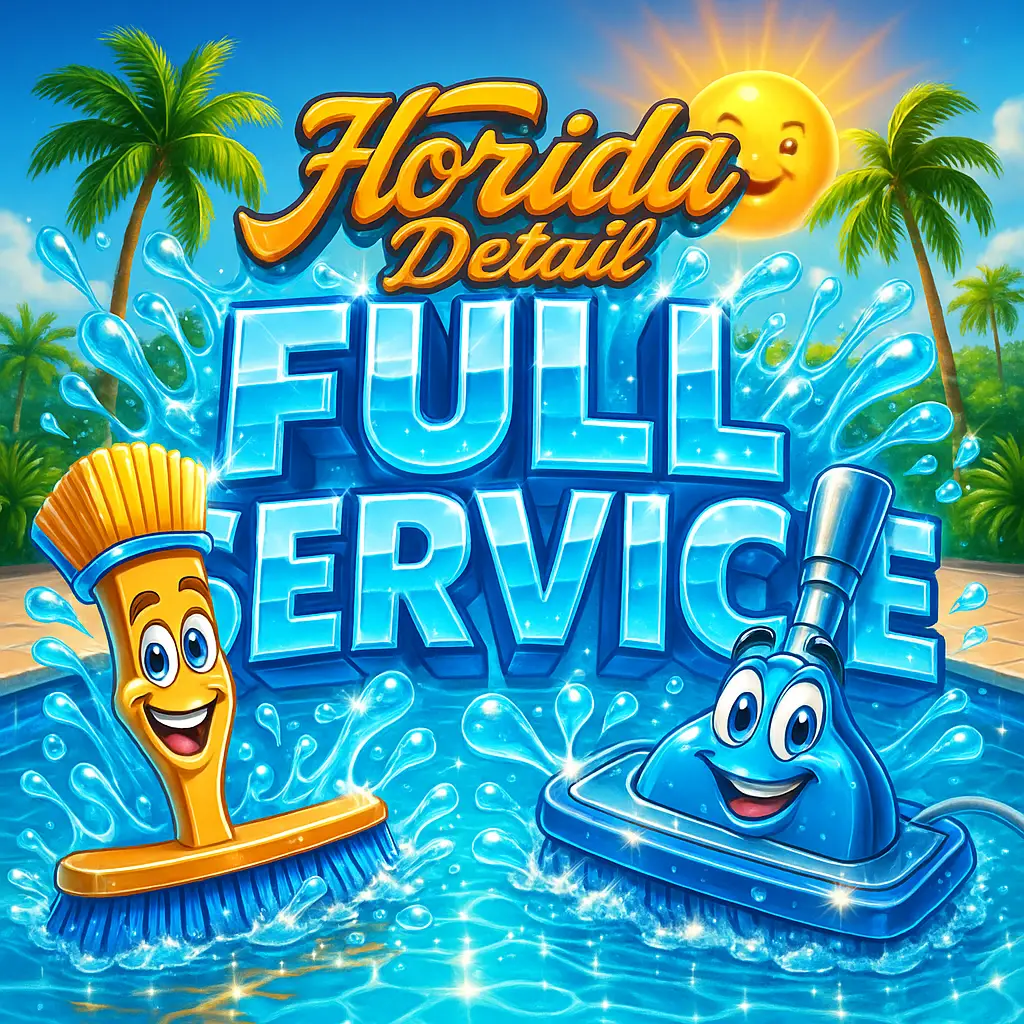How to Keep Your Pool Sparkling During Florida’s Rainy Season
Owning a pool in Florida is a dream come true—until the rainy season hits. From May through October, Charlotte County sees daily downpours, high humidity, and occasional tropical storms that can wreak havoc on your backyard oasis. If you live in Port Charlotte, Punta Gorda, North Port, or Rotonda, you know how quickly rain can turn a crystal-clear pool into a cloudy mess.
The good news? With the right pool care routine, your pool can stay sparkling clean all season long. In this guide, we’ll share expert tips tailored to Florida’s climate and show you how to protect your pool during the toughest weather months.
Why Florida’s Rainy Season Impacts Your Pool
Before we dive into solutions, let’s look at the common problems rain causes:
- Diluted chemicals → Heavy rainfall lowers chlorine and sanitizer levels.
- Unbalanced pH → Rainwater is slightly acidic, causing pH and alkalinity to drop.
- Debris overload → Leaves, pollen, and dirt wash into pools after storms.
- Algae growth → Warm water + lower sanitizer levels = green pool risk.
- Flooding & equipment stress → Overflow can damage pumps, filters, and electronics.
These issues are especially common in Charlotte County, where afternoon thunderstorms are a near-daily event.
1. Monitor and Maintain Proper Water Levels
Rain often causes pools to overflow, diluting chemicals and stressing filtration systems.
- Keep the water level halfway up your skimmer.
- After a storm, use a submersible pump or backwash your filter to reduce levels.
- Avoid letting water spill over onto your deck or landscaping, which can lead to erosion.
Pro Tip: Installing an overflow drain can save time during storm season.
2. Test Pool Water Frequently
During dry months, weekly testing is often enough. But in rainy season, you’ll want to check 2–3 times per week.
- pH should stay between 7.4–7.6.
- Alkalinity should be 80–120 ppm.
- Chlorine should remain 1–3 ppm.
If you notice constant pH drops after rain, consider using a stabilizer (cyanuric acid) to keep chlorine active longer.
👉 Learn more about our pool maintenance services to keep chemistry balanced year-round.

3. Shock Your Pool After Heavy Rains
Rain introduces contaminants like pollen, dust, and organic debris. The fastest way to reset your pool water is a shock treatment.
- Test chlorine levels.
- Add pool shock (super-chlorination) based on pool size.
- Run the pump continuously for 24 hours.
- Brush and vacuum the pool to remove algae spores.
This one step can prevent weeks of frustration with cloudy or green water.
4. Stay on Top of Debris Removal
In areas like Punta Gorda and North Port, oak trees and palm fronds often drop debris into pools during storms.
- Skim the surface daily.
- Empty skimmer baskets and pump baskets after each storm.
- Brush pool walls and steps weekly.
- Vacuum at least once a week (or more if you notice buildup).
Quick Callout: Debris not only makes your pool look dirty but also consumes chlorine as it decomposes—making your sanitizer work overtime.
5. Increase Pump Run Time
With higher debris and bacteria loads during rainy season, your filter needs extra support.
- Run pumps 8–12 hours daily.
- If using a variable-speed pump, keep it on low for circulation even when you’re not swimming.
- Clean or backwash filters regularly.
Many pool owners in Rotonda and Charlotte County set timers to automatically increase run times during summer months.
6. Use Preventive Algaecide
Florida’s warm, humid climate is an algae paradise. Prevent blooms before they start:
- Add a maintenance dose of algaecide weekly.
- Brush pool surfaces to expose hidden spores.
- Combine with regular shocking for best results.
If you’re away (like seasonal snowbirds often are), a professional pool service can handle this step to keep things under control.
7. Protect Your Pool Equipment
Rainy season doesn’t just affect your water—it can also damage your investment.
- Use surge protectors for pumps and heaters (especially in storm-prone areas like Port Charlotte).
- Install equipment covers to protect against flooding.
- Check that drainage around your equipment pad is clear.
For long-term peace of mind, consider scheduling professional inspections through Florida Detail.
8. Hire a Professional Pool Service in Charlotte County
Between chemistry swings, storms, and equipment care, pool maintenance can feel overwhelming. That’s where local professionals step in. Weekly pool service ensures:
- Consistent water testing & balancing.
- Thorough debris removal.
- Preventive maintenance that saves money long-term.
- Peace of mind when you’re away from home.
If you’re looking for trusted experts, check out:
For marketing insights on how local pool companies succeed, visit UnlimitedManiac.com.
Internal Resources You May Find Helpful
- Home – Learn more about Florida Detail.
- Services – Explore pool care options.
- Contact Us – Schedule a consultation today.
- Blog: Weekly Pool Service in Port Charlotte – Additional local guide.
Final Thoughts
Florida’s rainy season doesn’t have to mean cloudy, green, or overflowing pools. By staying proactive with water testing, shocking after storms, cleaning debris, and protecting your equipment, you can enjoy a crystal-clear pool all season long.
Whether you live in Port Charlotte, Punta Gorda, North Port, Rotonda, or anywhere in Charlotte County, keeping your pool in top condition comes down to consistency. And if you’d rather spend more time swimming than cleaning, professional help is always a smart option.
👉 Explore Florida Detail to connect with trusted local pool experts who know how to handle Florida’s toughest weather conditions.
